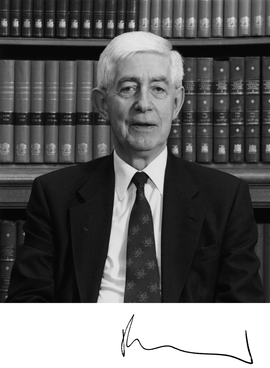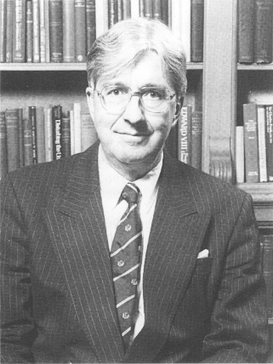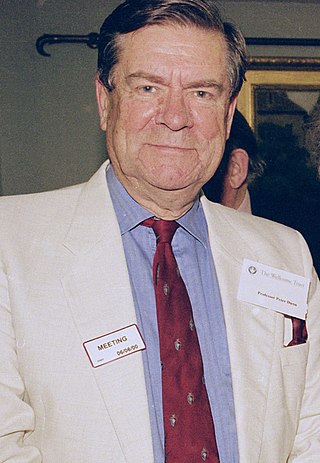Related Research Articles
Ivan Maurice Roitt is a British scientist. He was educated at King Edward's School, Birmingham and Balliol College, Oxford University. He was Head of the Department of Immunology at University College London from 1967 to 1992, and is currently Honorary Director of the Centre for Investigative & Diagnostic Oncology at Middlesex University, London, and is related to multi-award winning radio producer Colin Roitt.

Peter Neil Temple Wells CBE DSc FMedSci FREng FIET FInstP FLSW FRS was a British medical physicist who played a major role in the application of ultrasound technology in medicine.
Dr Lionel Vivian Crawford is a British cancer expert and virologist.
Sir Christopher Charles Booth was an English clinician and medical historian, characterised as "one of the great characters of British medicine".
Ian Robert Young was a British medical physicist, known for his work in the field of magnetic resonance imaging (MRI).

Elizabeth Matilda Tansey is an Emerita Professor of the history of medicine and former neurochemist, best known for her role in the Wellcome Trust's witness seminars. She previously worked at Queen Mary University of London (QMUL).
The History of Modern Biomedicine Research Group (HoMBRG) is an academic organisation specialising in recording and publishing the oral history of twentieth and twenty-first century biomedicine. It was established in 1990 as the Wellcome Trust's History of Twentieth Century Medicine Group, and reconstituted in October 2010 as part of the School of History at Queen Mary University of London.

Jack Martin Cuzick is an American-born British academic, director of the Wolfson Institute of Preventive Medicine in London and head of the Centre for Cancer Prevention. He is the John Snow Professor of Epidemiology at the Wolfson Institute, Queen Mary University of London.
Sir Netar Prakash Mallick is professor emeritus of renal medicine at the University of Manchester.
Dr Peter Jones FRCP is a British consultant paediatrician, known for his work in the fields of haemophilia and HIV/AIDS.

Edward Osmund Royle Reynolds, CBE, FRCP, FRCOG, FRCPCH, FMedSci, FRS, was a British paediatrician and Neonatologist who was most notable for the introduction of new techniques intended to improve the survival of newborns, especially those with respiratory failure, and for a series of papers regarding the value of techniques such as ultrasound imaging, nuclear magnetic resonance spectroscopy, and near infrared spectroscopy in determining the development and response to injury of the infant brain after birth.

Peter MacNaughton Dunn, FRCP, FRCOG, FRCPCH was an English paediatrician. Dunn was most notable for introducing into the UK the Gregory box in 1971, that provides Continuous positive airway pressure in the treatment of infant respiratory distress syndrome of the newborn and conducting research into Hip dysplasia and fetal adaptation to extrauterine life. Dunn was also notable for being known for founding the charity association British Association of Perinatal Medicine.
James Scott FRCP, FIBiol, FMedSci, FRS is a British cardiologist.

John Stephen Clifton FInstP, FIPEM was a British medical physicist.

Professor Alastair Vincent Campbell MA, BD, Th.D., FRSE is a British theologian and bioethicist. He was the founding editor of the Journal of Medical Ethics and received the Henry K. Beecher award from the Hastings Centre in 1999.
Sir Marcus Henry Richmond,, known as Mark Richmond, is a British biochemist, microbiologist and academic.
Ann Prentice is a British nutritionist.
Professor Charles Samuel Bernard Galasko ChM, FRCS, FRCSEd, FCMSA (Hon), FFSEM (Ire), FFSEM (UK), FMedSci, often cited as Charles S. B. Galasko, is a South African orthopaedic surgeon.

Alan Eglin Heathcote Emery is a British medical geneticist, known for his study of muscular dystrophy.
Tom Blackburn FBPharmacolS, FRSB is a British industrial pharmacologist.
References
- ↑ Launder, Brian (2023). "Peter Damian Richardson. 22 August 1935 — 21 April 2020". Biographical Memoirs of Fellows of the Royal Society. 75.
- 1 2 3 4 5 "Richardson, Peter". Brown University . Retrieved 21 June 2017.
- ↑ Lois Reynolds; Tilli Tansey, eds. (2005). The Recent History of Platelets in Thrombosis and Other Disorders. Wellcome Witnesses to Contemporary Medicine. History of Modern Biomedicine Research Group. ISBN 978-0-85484-103-5. OL 27084715M. Wikidata Q29581691.